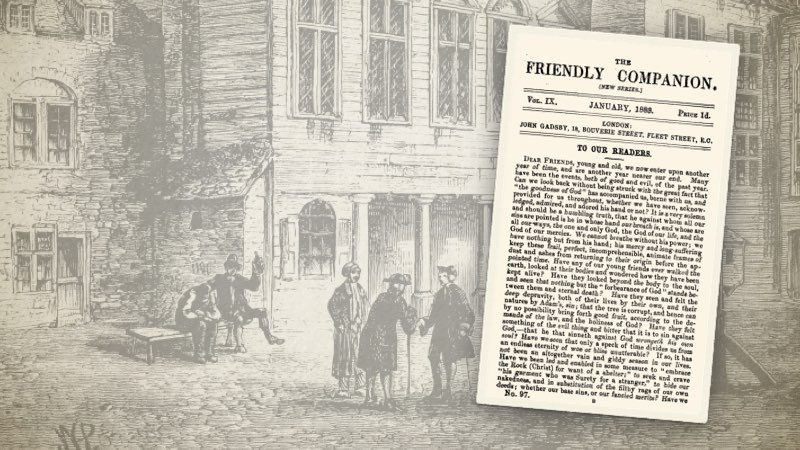
God’s Care Of His People
The Friendly Companion 1883:
Dear Children,—I have thought that it might not be altogether unprofitable to devote a little time to the very remarkable subject of the passage of the children of Israel through the Red Sea.
It is a circumstance that manifests God’s great and glorious power in the deliverance of his own people Israel; but awful vengeance indeed in the destruction of their enemies.
We find the children of Israel encamped in a valley between two high hills, or mountains. The Red Sea lay before them, the impassable mountains on either side, so that, to all human appearance, there is no way out of this place but the way by which they came, and that is now blocked by a host of enemies. Now, although they are in such a critical place, it is worthy of notice that they are thereby God’s special command. God had given his servant Moses instructions to bring them here. (See Ex. 14:1,2) Verses 3 and 4 seem to show us the Lord’s design in bringing them there, viz., that Pharaoh may think he can easily overtake and spoil them, Pharaoh thinks he has got them in a trap, and will be able to do just as he likes with them again. But God had begun to deliver them, and the God of Israel never does anything by halves. “His work is perfect.” Nevertheless, Pharaoh gives the command, and six hundred chosen chariots, all furnished with men and arms, are in full chase after these poor defenseless Israelites. Defenseless did I say? I will recall that expression; for as the issue proves, they are well defended, yea, defended by Almighty Power. But Pharaoh, poor blind fool that he was, could not see that, or doubtless he would have remained in Egypt. He pursues them, as some writers tell us, with an army of 50,000 horsemen and about 200,000 footmen; others say a great many more, even 600,000; but the smaller number makes a very great army to come up on the children of Israel, with all their wives and their little ones. Methinks it must have been a very terrible sight indeed to see such a host of bloodthirsty men coming upon them, and no way of escape open.Towering mountains on each side, and the deep wide sea before them . Who can picture the anguish of a fond father as he looks first at the mother with her little ones and then at their enemies. But what is the result? Why, in the midst of their trouble they “cried out unto the Lord;” and when we consider the vast multitude of people encamped in this place, methinks I tmust have been a crying indeed. We are told that there were upwards of two millions and a half in this bitter distress, besides all their flocks and herds.
Moses, their leader, bids them stand still. No doubt they were exceedingly restless, and not much like standing still at such a time; but Moses has faith in God, and believes the thing will end well. Therefore, he says, “Stand still and see the salvation of the Lord.” (Ver.13) The mighty God now speaks, and speaks to purpose too. “Speak unto the children of Israel that they go forward, but lift thou up thy rod, and stretch out thine hand over the sea and divide it; and the children of Israel shall go on dry ground through the midst of the sea.” Moses obeys God’s command, and the sea is divided, an open way is made through the midst of the mighty waters; yes, the waters are piled up on either side like two high walls. Such a sight never was seen before. But what will God not do for his crying people. If there be no other way of escape, he will make one even through the sea.
But there is something more here worthy of notice. As we observed before, Pharaoh and his host are almost close upon them, and no way is open. The sea is not divided; they are not yet prepared for marching. It is needful that something should be done even while the waters are dividing. But Israel’s God is not at a loss for means for the protection of his people; therefore, the angel and the cloud remove from before and go behind the camp of Israel; between them and the Egyptians. To the Israelites this cloud is a light during the darkness of the night, but darkness and confusion to the Egyptians. It was also a defense and safeguard to the Israelites, but a terror and dismay to the Egyptians. God provided a barrier that the determined host of Pharaoh could neither surmount nor break down. And now away is made even through the midst of the sea; and the people at God’s command, encouraged by his servant Moses, go forward through the sea upon dry land. They do this at God’s bidding; therefore are perfectly safe. The Egyptians were presumptuous enough to follow them, but they had no authority to take such a step. The Lord had made no agreement with them; therefore, no sooner were his people safe than he commanded those walls of water to fall down. Methinks I see them rolling together like two mighty floods, hurled together by the tremendous power of God. His power had been displayed in separating, now it is displayed in uniting them to the entire overthrow of all the Egyptians. Who can read the account and say that a wonderful miracle was not wrought? How timely is the God of Israel in the performance of his mighty exploits!Everyone of his people is safely delivered, and everyone of the Egyptians is destroyed; not one left even to carry the sad tidings back to Egypt. Dear children, do you not see that this was a glorious display of God’s great power in the deliverance of his people!
And they sang of it, too, when they saw their enemies dead upon the seashore. But how awful, how terrible, in the destruction of those that sought to destroy them.
Now I need scarcely ask you which you would rather be, a friend or an enemy to God, as I feel assured you would all say you would be his friend. And yet I have great reason to fear that much the greater part of you are enemies to God as the Egyptians were. You were born such and you grow up such, and will live and die such, unless God is pleased of his great goodness to make you his friends.
My dear children, let us try if we cannot learn some useful lesson from this wonderful circumstance. It may be for your profit in years to come if you lay it up in your youthful minds and ponder it in your hearts. In a few years, if you are spared, you will be grown up to be men and women, and perhaps many of you still with unrenewed hearts. Children, it is a solemn thought, but no less solemn than true. An unrenewed heart is at enmity with God, and with the Word and ways of God. My prayer for you is that you may have a renewed heart, that you may love God, his Word, his ways, and his people too. But God must give you this, neither your parents nor your teachers can give you this great blessing. But if you grow up with unrenewed hearts, never fight against, never persecute, wrong, or try to injure the people of God, for they may go and tell God about it; yes, cry to him for help against you, and you see what God did for the Israelites, and he is the same God now. If you want further proof, read about Daniel being cast into the den of lions, how the Lord preserved him, and what was the fate of his enemies; also about the three Hebrew children being cast into the fiery furnace, yet they came out unhurt. Not so the men that cast them in. Again, read of Mordecai’s “loud and bitter cry.” (Est.iv.)
Though I write this, I hope none of you scholars will grow up enemies to God or his people. But all Sunday scholars do not grow up to be good men and women, nor do they all go to heaven when they die.
Another lesson we may learn from this is that we may safely do whatever God bids us. The children of Israel came up out of Egypt to the borders of the Red Sea at God’s command, and though their enemies pursued them they were preserved in safety. He bade them go through the sea; they obeyed, went, were brought safely through, and finally delivered from the Egyptians.
Another lesson we may learn,—for it is fraught with instruction—is, if we get into trouble, into difficulty or distress, and none can help us out, neither can we help ourselves, yet God is able, and if enabled to pray to him aright, he will help us and deliver us, even as he has helped his people in all ages, and has promised to do so down to the end of time. The Lord tells his people to call upon him in the time of trouble, and he promises to hear them, and deliver them, and they shall glorify him.
Now, my dear children,I hope I have not spent my time in vain. Try if you can learn some useful lesson by it, something that may profit you. And now, in conclusion, I would say, do try and be good children; obedient to your parents, obedient your teachers, and, above all, may the Lord teach you to obey him, and by your obedience to manifest your love to him, and this will be better for you than if you possessed thousands of gold and silver; for the gold and silver you must leave behind you in a dying hour, but love to God will wear its full bloom through a long eternity.
Your well-wishing Friend,
Joseph
It may be argued the Strict and Particular Baptist churches of the 17th, 18th and early 19th centuries were at their strongest when they remained independent congregations, unaffiliated with Magazines and Societies. This strength was lost during the latter half of the 19th century when the churches clamored around favorite periodicals and regional associations. Although the Magazines were largely responsible for creating a party-spirit and culpable for stirring up needless controversy, they nevertheless contain many valuable resources which may prove a blessing for this generation. Although they differed on various points of doctrine, they invariably held to high views of sovereign grace, denouncing as heresy the pernicious teachings of Andrew Fuller. The majority of Strict and Particular Baptist churches during the 18th and 19th centuries were Hyper-Calvinists.



